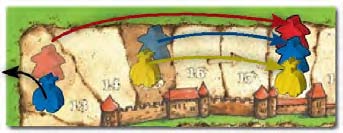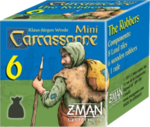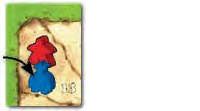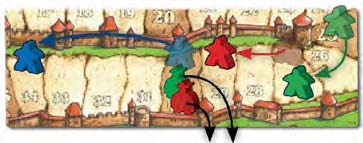The Robbers (1st edition)/it
 |
You are reading the rules for this tile design. |
 | Read the following rules if your tiles look like this. |  |
| If your tiles have a different design, then choose a game from Spin-offs. |  |
Robbers have taken over the roads and stolen the travellers’ gold. When followers score points, robbers are never far behind.
General info and comments
Informazioni generali e commenti
The Robbers (Mini #6) was originally released by Hans im Glück in 2012.
This expansion has been developed for the Carcassonne basic game. All the basic game rules still apply in addition to the expansion rules below.
Contenuti
- 6 wooden Robber figures in 6 colors
- 8 new land tiles with robber symbol
- 1 new land tile with crop circle
Regole
Preparazione
The landscape tiles with the robber symbol are mixed with the other landscape tiles. Each player takes the robber of his or her color.
Posizionare una tessera
When a player draws a tile with a robber symbol, he or she plays it according to normal rules.
Placing a Robber
The player may immediately [1] place his or her robber figure on the scoreboard. The robber is placed on the same space as at least one counting follower of another player. [2] The next player whose robber is still in his or her own stock may also place his or her robber in the same way. [3] If the active player had already played his robber, he may move his robber figure.
Posizionare un meeple
Then the player may place a follower according to the usual rules.
Scoring a feature
"Robber" Points
When a counting figure of another player moves forward, if a robber stood on the space where that follower started, the owner of the robber gets half of the points (rounded up). [4] [5] The player moving his counting figure gets all of his points. The owner of the robber moves his counting figure the appropriate number of spaces on the scoreboard. The robber is then placed back into the player's supply. [6]
Altre regole
- Rogue points: If the robber is next to a counting follower that scores points gained by robbing another player, the robber’s player scores no points. Instead, the robber moves forward with (next to) that follower so that the robber can rob the follower later. ("Honor among thieves")
- A robber must always take the first allowable points awarded (i.e. other than “rogue points”). He may not wait for a possible larger score later. [7]
- If a robber is on the same space as several counting followers, and more than one of these followers scores points on the same turn, the owner of the robber can choose which counting follower’s points to gets half of. [8] [9] [10] [11]
- If more than one robber are in a space with a follower that scores, all robbers get half of the follower’s points.
- One may not rob his or her own follower.

Punteggio finale
All robbers remaining on the scoreboard receive 3 points. Then the robbers return to the players’ supplies. [12]
Detailed Examples Using the Robber and the Messages
Esempio #1
BLUE has a Robber on the same space as RED’s Woman Follower. RED’s Normal Follower is on a different space. With placement of one tile, RED scores points for both a road (3 points) and a city (6 points).
Each feature is scored separately. RED decides which of his/her scoring figures moves on the scoring board. BLUE only receives "Robber points" for the first movement of the scoring figure that stands on the same space as the Robber – here RED’s Woman Follower.
Uno dei seguenti 4 scenari potrebbe verificarsi:
- First, the Woman Follower scores 3 points for the road. After that, the Normal Follower scores 6 points for the city. Then the Robber robs half of the points from the Woman Follower (2 Points).
- First, the Normal Follower scores 3 points for the road. After that, the Woman Follower scores 6 points for the city. Then the Robber robs half of the points from the Woman Follower (3 Points).
- First, the Woman Follower scores 3 points for the road. After that, the Woman Follower scores 6 points for the city. Then the Robber robs half of the points for the road (the first score) from the Woman Follower (2 Points). [13]
- First, the Normal Follower scores 3 points for the road. After that, the Normal Follower scores 6 points for the city. Here, the Robber robs nothing from RED because the Normal Follower was not on the same space as the Robber.
Esempio #2
BLUE has a Robber on the same space as GREEN’s Normal Follower and RED’s Woman Follower. The other scoring figures for GREEN and RED are standing on different spaces. With placement of one tile, GREEN scores points for a road (3 points) and RED scores points for a city (6 points).
The Robber is on a space occupied by more than one scoring figure, and both of the scoring figures (more than one) are scoring points. Thus, the Robber chooses which player he will "rob" half of the points from. GREEN and RED can choose which of their scoring figures move when points are scored. The Robber can only receive points from a scoring figure that stands on the same space.
Uno dei seguenti 3 scenari potrebbe verificarsi:
- GREEN and RED both decide to score with their scoring figures that are standing on the same space as the Robber. The Robber decides to rob the half of the points from the Woman Follower (3 Points).
- GREEN decides to score with the Normal Follower and RED also decides to score with the Normal Follower. The Robber can only rob the half of the points from GREEN’s Normal Follower (2 Points) since RED’s Normal Follower is not on the same space as the Robber.
- GREEN and RED both decide to score with their scoring figures that are standing on different spaces from the Robber. The Robber can't rob any points from the Woman Follower or the Normal Follower, as the Robber isn’t on the same space as either one of them.
Esempio #3
BLUE has a Robber on the same space as GREEN’s Normal Follower, GREEN’s Woman Follower, and RED’s Normal Follower. RED’s Woman Follower stands on a different space. With placement of one tile, GREEN scores points for a road (3 points) and for a city (6 points), and RED scores points for a road (2 points) and for a city (8 points).
Each feature scores separately. GREEN and RED can choose which of their scoring figures will score the points. The Robber can only receive points from a scoring figure that stands on the same space as the Robber. In this case, the Robber can definitely receive points from GREEN, because both scoring figures from GREEN are on the same space. The Robber’s ability to rob points from RED will depend on which figure(s) RED chooses to move. Since the Robber is on a space occupied by more than one scoring figure, and more than one figure is scoring points, the Robber chooses which player he is "robbing" half the points from. The Robber gets all of the information that he/she needs about movement from the other players (RED and GREEN) before making the best decision about which points to rob.
Uno dei seguenti 3 scenari potrebbe verificarsi:
- GREEN and RED each score with one of the scoring figures that was standing on the same space as the Robber. They both decide to score their roads first. GREEN first scored the road worth 3 points with the Woman Follower. RED then scored the road worth 2 points with the Normal Follower. The Robber decided to rob half of the points from the Woman Follower (2 points), because robbing the Normal Follower would have only been worth 1 point.
Since both GREEN and RED chose to score their cities second with the same followers, the Robber could not get half of the points from either city. The Robber could only choose to rob the first GREEN points or the first RED points available. If, however, GREEN had scored the city with the Normal Follower, the Robber could have robbed half of those points, since that would have been yet another follower to choose to rob from. - RED decides to first score the road worth 2 points with the Woman Follower, which does not stand on the same space as the Robber. GREEN first scores the road worth 3 points with the Woman Follower. RED then uses the Normal Follower to score the city worth 8 points. The Robber decides to rob half of the points from the Normal Follower (4 points), because there were only 2 points available from the Woman Follower.
- RED decides to first score the road worth 2 points with the Woman Follower, which does not stand on the same space as the Robber. Then RED also scores the city worth 8 points with the Woman Follower. GREEN first scores the city worth 6 points with the Normal Follower. The Robber can only rob half the points from the Normal Follower (3 points) because the Woman Follower is not standing on the same space as the Robber.
Esempio #4
The BLUE Robber and the YELLOW Robber are on the same space as GREEN’s Normal Follower, GREEN’s Woman Follower, and RED’s Normal Follower. RED's Woman Follower stands on a different space. With placement of one tile, GREEN scores points for a road (3 points) and for a city (6 points), and RED scores points for a road (2 points) and for a city (8 points).
Each feature scores separately. GREEN and RED can choose which of their scoring figures will score the points. The BLUE Robber and YELLOW Robber can only receive points from a scoring figure that stands on the same space that each of them is on. In this case, the BLUE Robber and the YELLOW Robber can definitely receive points from GREEN, because both scoring figures from GREEN are on the same space. The Robbers’ ability to rob points from RED will depend on which figure(s) RED chooses to move. Since the BLUE Robber and YELLOW Robber are on a space occupied by more than one scoring figure, and more than one figure is scoring points, each Robber chooses which player he is "robbing" half the points from. The BLUE Robber and YELLOW Robber get all of the information that they need about movement from the other players (RED and GREEN) before making the best decision about which points to rob.
Uno dei seguenti 3 scenari potrebbe verificarsi:
- GREEN and RED each score with one of the scoring figures that was standing on the same space as the BLUE and YELLOW Robbers. They both decide to score their roads first.
GREEN first scored the road worth 3 points with the Woman Follower. RED then scored the road worth 2 points with the Normal Follower. The BLUE Robber decided to rob half of the points from the Woman Follower (2 points), and the YELLOW Robber decided to rob the Normal Follower (1 point). Why choose to take fewer points? If YELLOW is the active player and can receive a message, this makes more sense. - RED decides to first score the road worth 2 points with the Woman Follower, which does not stand on the same space as the Robbers. GREEN first scores the road worth 3 points with the Woman Follower. RED then uses the Normal Follower to score the city worth 8 points. The BLUE Robber and the YELLOW Robber each decide to rob half of the points from the Normal Follower (4 points), because there were only 2 points available from the Woman Follower.
- RED decides to first score the road worth 2 points with the Woman Follower, which does not stand on the same space as the Robbers. Then RED also scores the city worth 8 points with the Woman Follower. GREEN first scores the city worth 6 points with the Normal Follower. The BLUE Robber and YELLOW Robber can only rob half the points from the Normal Follower (3 points) because the Woman Follower is not standing on the same space as the Robbers.
The crop circles addition
In each mini, you will find a tile of the 7th mini expansion ![]() Crop Circles. This expansion is playable with only a single tile, but it is best to play with all 6 tiles. [14]
Crop Circles. This expansion is playable with only a single tile, but it is best to play with all 6 tiles. [14]
Tile Distribution
Note
Per la licenza e informazioni riguardo le icone visitare Icone.
- ↑
 The word "immediately" was added to the 2013 version of the rules. (12/2013)
The word "immediately" was added to the 2013 version of the rules. (12/2013)
- ↑
 If playing with
If playing with  Mini #2 - The Messages expansion, the Robber can be placed beside either a normal counting follower or the Messenger (woman follower). Thus, the Robber can get points from either a normal counting follower or a woman follower, but only from the one on the same space as the Robber. (5/2013)
Mini #2 - The Messages expansion, the Robber can be placed beside either a normal counting follower or the Messenger (woman follower). Thus, the Robber can get points from either a normal counting follower or a woman follower, but only from the one on the same space as the Robber. (5/2013)
- ↑
 The ZMG version of the rules (
The ZMG version of the rules ( Big Box 4) changes this to state “Then, in turn order, each other player may place their robber on the scoreboard.” (Emphasis added.) (5/2013)
Big Box 4) changes this to state “Then, in turn order, each other player may place their robber on the scoreboard.” (Emphasis added.) (5/2013)
- ↑
 The Robber can receive points from The Wheel of Fortune or fairy scoring. (5/2013)
The Robber can receive points from The Wheel of Fortune or fairy scoring. (5/2013)
- ↑ If the Robber is on a space with a counting follower that moves backwards (such as from a bazaar payment or tower ransom), the Robber moves backwards with the counting follower, but the player who owns the Robber does not lose points. (3/2015)
- ↑
 When the last tile is placed, scoring for finished features takes place as usual, as the robber can still steal points. Then all robbers still remaining on the scoring board receive 3 points per the final bullet point in the rules. After that the actual final scoring begins. (updated 12/2013)
When the last tile is placed, scoring for finished features takes place as usual, as the robber can still steal points. Then all robbers still remaining on the scoring board receive 3 points per the final bullet point in the rules. After that the actual final scoring begins. (updated 12/2013)
- ↑
 Each scoring event is separate from all others – each feature is scored individually. The Robber must take points only from the first allowable event – single feature points, fairy point, catapult points, Wheel of Fortune points, etc. (5/2013)
Each scoring event is separate from all others – each feature is scored individually. The Robber must take points only from the first allowable event – single feature points, fairy point, catapult points, Wheel of Fortune points, etc. (5/2013)
- ↑
 If a single counting follower moves multiple times due to scoring of more than one feature with placement of a single tile, the player receiving the points chooses the order that points are awarded. If there is a robber beside that follower, the owner of the robber would thus receive half the points of only the first feature that is scored. Of course, if multiple followers on the same space receive points, the Robber’s owner can still choose which follower to steal points from. (5/2013, 11/2014)
If a single counting follower moves multiple times due to scoring of more than one feature with placement of a single tile, the player receiving the points chooses the order that points are awarded. If there is a robber beside that follower, the owner of the robber would thus receive half the points of only the first feature that is scored. Of course, if multiple followers on the same space receive points, the Robber’s owner can still choose which follower to steal points from. (5/2013, 11/2014)
- ↑
 Although this rule refers to multiple followers scoring in “the same turn,” the robber cannot necessarily wait until the end of the entire turn to see if it applies. Rather, the robber can only consider those scoring events that would be happening simultaneously, i.e. during the same “scoring round” (see
Although this rule refers to multiple followers scoring in “the same turn,” the robber cannot necessarily wait until the end of the entire turn to see if it applies. Rather, the robber can only consider those scoring events that would be happening simultaneously, i.e. during the same “scoring round” (see  Mini #2 - The Messages expansion for further discussion). For example, the fairy scoring is separate from scoring of normal features. Thus, if the robber could score due to the fairy point he must take that score; he cannot wait for other events later in the turn. (10/2014)
Mini #2 - The Messages expansion for further discussion). For example, the fairy scoring is separate from scoring of normal features. Thus, if the robber could score due to the fairy point he must take that score; he cannot wait for other events later in the turn. (10/2014)
- ↑
 If a robber is on the same space as counting followers from 2 other players, and one of those followers scores points from robbing another player (rogue points) while the other player does not score anything, the robber must move with the follower rather than staying behind. (Bullet point 1 applies here, but bullet point 3 does not, as only 1 follower is getting points.) (5/2014)
If a robber is on the same space as counting followers from 2 other players, and one of those followers scores points from robbing another player (rogue points) while the other player does not score anything, the robber must move with the follower rather than staying behind. (Bullet point 1 applies here, but bullet point 3 does not, as only 1 follower is getting points.) (5/2014)
- ↑
 If the Robber is on a space with multiple counting followers, and one of them moves backwards (such as from a bazaar payment or tower ransom), the player who owns the Robber can choose to either move the Robber backwards with that counting follower or keep the Robber in the same place with the other counting follower(s). (3/2015)
If the Robber is on a space with multiple counting followers, and one of them moves backwards (such as from a bazaar payment or tower ransom), the player who owns the Robber can choose to either move the Robber backwards with that counting follower or keep the Robber in the same place with the other counting follower(s). (3/2015)
- ↑
 This rule regarding scoring for robbers at the end of the game was added to the 2013 version of the HiG rules – it was not present in the 2012 or
This rule regarding scoring for robbers at the end of the game was added to the 2013 version of the HiG rules – it was not present in the 2012 or  Big Box 4 versions, and it is thus not included in RGG or ZMG rules. This actually represents a reversal of a previous clarification, as robbers remaining on the scoreboard at the end of the game originally scored nothing. (12/2013)
Big Box 4 versions, and it is thus not included in RGG or ZMG rules. This actually represents a reversal of a previous clarification, as robbers remaining on the scoreboard at the end of the game originally scored nothing. (12/2013)
- ↑
 RED could have chosen to score the city first, in which case BLUE’s robber would score 3 points. However, it is unlikely that doing that would be in RED’s best interests.
RED could have chosen to score the city first, in which case BLUE’s robber would score 3 points. However, it is unlikely that doing that would be in RED’s best interests.
- ↑
 Note that the Crop Circle tiles included in the mini expansions are different from the tiles released in the initial Crop Circles expansion (referred to as "Crop Circles I").
Note that the Crop Circle tiles included in the mini expansions are different from the tiles released in the initial Crop Circles expansion (referred to as "Crop Circles I").












